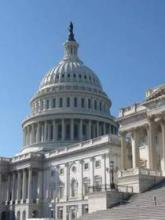*Article updated 12/18/14
The massive $1.1 trillion spending bill that was approved by Congress before it left for an extended recess included several provisions aimed at bolstering Alzheimer’s disease research.
The bill, signed into law by President Obama on Dec. 16, fully incorporated the Alzheimer’s Accountability Act. That bipartisan proposal requires the director of the National Institutes of Health to submit an annual budget to Congress until 2025, spelling out the amount of money needed to meet each milestone of the National Plan to Address Alzheimer’s Disease.
The Alzheimer’s Accountability Act (H.R. 4351/S. 2192) was introduced in April.
“The Alzheimer’s Association urged the introduction and passage of this Act so that Congress understands what science will bring us to the day when there will be survivors of Alzheimer’s, just as there now are for the other major diseases in our country,” said Harry Johns, president and CEO of the Alzheimer’s Association, in a statement after the spending bill’s passage.
“It facilitates a dialog between the people doing the research and the people doing the appropriations,” said Dr. Daniel C. Potts, associate clinical professor at the University of Alabama, Tuscaloosa, and a member of the American Academy of Neurology’s Government Relations Committee.
The Association said that the Accountability Act creates “a mechanism that will utilize rigorous scientific judgment, rather than shifting political interests and unforeseen events, to guide Congressional funding allocations.”
The federal spending bill, which keeps the government funded through Sept. 30, 2015, also includes a $25 million increase for Alzheimer’s research, according to the Alzheimer’s Association. The group noted that this year’s increase comes after a $122 million increase in fiscal 2014. Altogether, federal funding for Alzheimer’s research stands at $591 million.
But that is not enough, the association said. “According to leading experts, we must dramatically increase research funding to accomplish the primary goal of the National Alzheimer’s Plan to prevent and effectively treat Alzheimer’s by 2025,” Mr. Johns said.
“We’re woefully, woefully underfunding Alzheimer’s disease compared with other leading causes of morbidity and mortality in this country,” Dr. Potts agreed. But he said that the additional funding this year – and a bipartisan agreement to focus more on scientific, rather than political, priorities are a step in the right direction.
Alzheimer’s is a “sociocultural atom bomb,” said Dr. Potts, adding, “I think people are beginning to realize this.”
On Twitter @aliciaault


